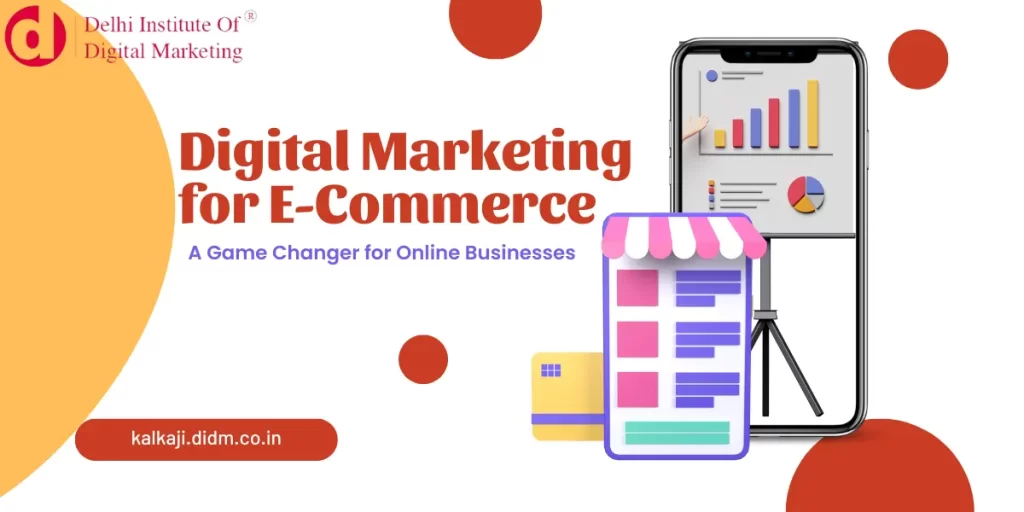
In today’s fast-paced digital world, e-commerce brands are increasingly relying on digital marketing for e-commerce strategies to drive their growth. Effective marketing is essential for reaching a broader audience, boosting conversions, and establishing lasting customer relationships. By harnessing the power of digital channels, online businesses can gain a competitive edge, ensuring they thrive in the rapidly evolving online marketplace. The ability to implement the right digital marketing for e-commerce tactics can significantly impact an e-commerce brand’s success and long-term sustainability.
1. Social Media for E-Commerce: Building Brand Awareness
One of the most powerful tools in digital marketing for e-commerce is social media. Platforms like Instagram, Facebook, Twitter, Pinterest, and TikTok offer e-commerce brands a direct channel to interact with customers, promote their products, and build brand awareness. Social media for e-commerce allows businesses to not only engage with their target audience but also drive traffic to their websites and boost sales.
By utilizing targeted ads, e-commerce brands can reach potential customers based on their interests, demographics, and online behavior. Consistent engagement, promotional campaigns, and influencer partnerships can help e-commerce businesses gain traction and stay top of mind with their audience. Social media for e-commerce also allows businesses to gather valuable insights into customer preferences and feedback, enabling them to make informed decisions about future marketing strategies.
2. Search Engine Optimization (SEO) for Organic Traffic
When it comes to driving organic traffic to an e-commerce website, SEO plays a crucial role. Digital marketing for e-commerce heavily relies on optimizing websites to rank higher in search engine results pages (SERPs). By targeting relevant keywords, optimizing product descriptions, improving site speed, and building backlinks, e-commerce brands can significantly increase their visibility.
Effective SEO strategies can help e-commerce businesses attract organic traffic without relying on paid ads. This not only saves money in the long run but also helps to establish trust with potential customers who are more likely to purchase from websites that rank highly on search engines. To maximize SEO, it’s important to keep updating content and optimize for mobile devices, as a large percentage of e-commerce transactions occur via smartphones.
3. Pay-Per-Click Advertising (PPC): Immediate Results
While organic traffic is essential, paid advertising also plays a vital role in digital marketing for e-commerce. Pay-per-click (PPC) campaigns, such as Google Ads, provide immediate visibility for e-commerce brands. These ads appear at the top of search engine results, ensuring that businesses get exposure to users who are actively searching for products or services related to their offerings.
PPC advertising allows e-commerce brands to target specific keywords and demographics, ensuring that the right people see their ads. Through retargeting strategies, businesses can reach customers who have previously visited their websites but didn’t complete a purchase. This strategy significantly increases the chances of conversions by reminding potential customers about the products they were interested in.
4. Email Marketing: Nurturing Customer Relationships
Email marketing is one of the most effective and cost-efficient strategies for e-commerce brands. Digital marketing for e-commerce can include email campaigns that nurture customer relationships, promote sales, and encourage repeat business. Through personalized emails, e-commerce brands can deliver tailored content, offers, and product recommendations to customers, increasing the likelihood of conversions.
One of the most powerful features of email marketing is segmentation. By segmenting their email lists based on customer behavior, purchase history, or demographic data, e-commerce brands can send highly relevant messages to different groups of customers. For example, a brand could send a special offer to customers who haven’t made a purchase in a while, or a product recommendation based on a previous purchase.
Additionally, automated email sequences such as welcome emails, abandoned cart reminders, and post-purchase follow-ups help e-commerce businesses maintain customer engagement throughout the entire buying journey.
5. Content Marketing: Driving Traffic and Establishing Authority
Content marketing is another essential component of digital marketing for e-commerce. Creating valuable, informative, and engaging content helps e-commerce brands establish authority in their industry while attracting potential customers. Blogs, videos, info graphics, and tutorials can be used to provide useful information related to the products or services a brand offers.
For instance, an e-commerce store selling fitness equipment might create content around workout tips, training routines, and product reviews. This type of content not only attracts search engine traffic but also builds trust with customers, as they begin to view the brand as an expert in the field. Effective content marketing can also drive more social media engagement, as people are more likely to share valuable content with their networks.
By providing valuable content that solves problems or answers questions, e-commerce brands can build a loyal following of customers who are more likely to make a purchase.
6. Utilizing Analytics for Optimization
One of the most significant advantages of digital marketing for e-commerce is the ability to track and measure results in real-time. Analytics tools, such as Google Analytics, provide e-commerce brands with valuable data on user behavior, traffic sources, conversion rates, and more. By analyzing this data, businesses can identify which marketing strategies are working and which need improvement.
Regularly monitoring website and campaign performance allows e-commerce brands to make data-driven decisions. For example, if a particular product page is seeing high traffic but low conversions, it may be time to optimize the page design, adjust the pricing, or improve the product description. Continuous optimization ensures that marketing efforts remain effective and aligned with business goals.
Conclusion: Digital Marketing for E-Commerce Is Essential for Success
In conclusion, digital marketing for e-commerce is a powerful tool that enables online brands to expand their reach, drive sales, and build lasting relationships with customers. By utilizing strategies like social media for e-commerce, SEO, PPC, email marketing, and content creation, businesses can stay competitive in the ever-evolving online marketplace.
To take full advantage of digital marketing for e-commerce, business owners can also invest in training opportunities like a Digital Marketing course online or join an online digital marketing institute. These resources can help e-commerce brands and entrepreneurs stay ahead of the curve and implement cutting-edge marketing strategies.
With the right digital marketing for e-commerce strategies, any e-commerce brand can increase visibility, drive traffic, and ultimately convert leads into loyal customers, ensuring long-term success in the digital age.

